No doubt about it: putting together a saltwater aquarium is an exciting project!
There are so many choices to make: LPS or SPS corals, rocks, reef-safe fish, and invertebrates. The combinations to make up your perfect tank are endless!
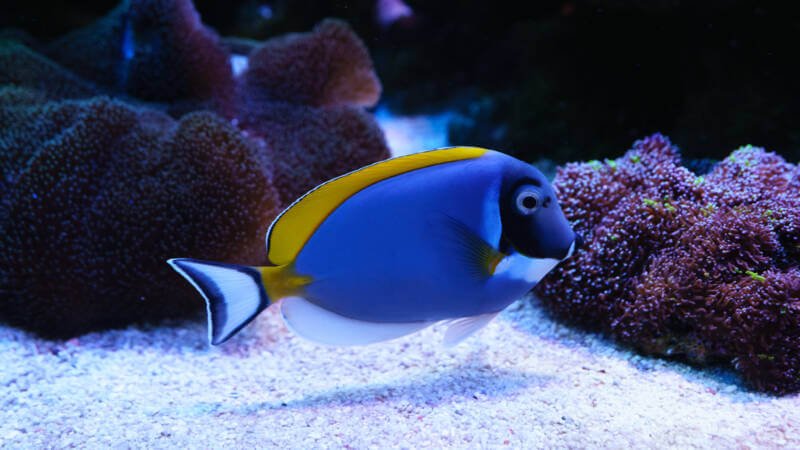
When selecting marine fish for your tank, do you pick the most beautiful fish, or do you build your tank around the most compatible combinations?
Ultimately, what you want are reef safe species and an harmonious environment. To get this, you need saltwater fish with agreeable temperaments.
It is difficult to ensure anyone species will be 100 percent “reef safe.”
Even if one species tends toward coral safe or invertebrate safe behavior, poor tank conditions, stressors, or even individual personalities can prove otherwise.
Best Reef Safe Fish for your Marine Tank
1. Clownfish
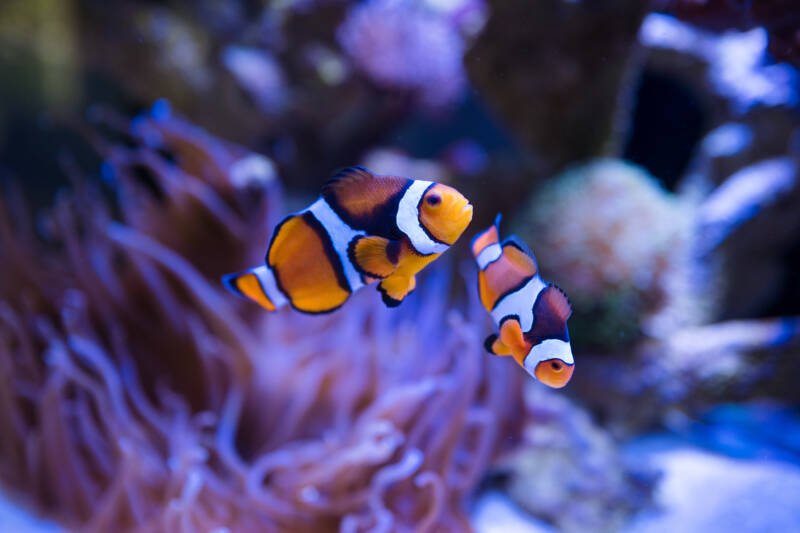
Minimum Tank Size: 20 gallons
Perhaps the most easily recognizable of our selection, the clownfish is a popular choice for reef aquariums.
Small and hardy, these fish are best kept in pairs, especially if you are new to keeping them.
Pairs will often establish and vigorously defend a territory. You will need a larger tank size to keep additional pairs and other reef fish.
There are about 30 varieties of clownfish. Most of us think of the ocellaris clownfish, with its characteristic orange body, white stripes, and black outlines.
In addition, there are skunk, percula, clarkii, maroon, tomato, and saddleback clownfish.
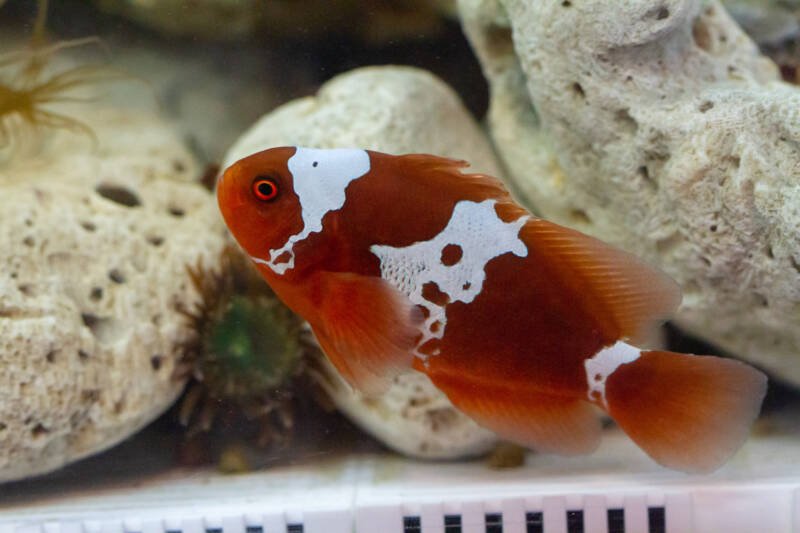
These fish do well in community reef tanks or species-only tanks.
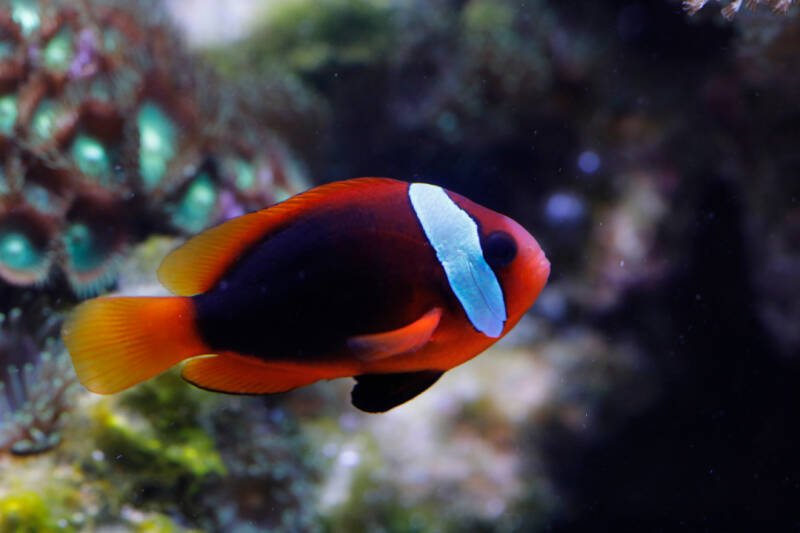
Feel free to add some anemones as both captive-bred and wild-caught clownfish use anemones for protection while feeding off parasites.
2. Midas Blenny (Ecsenius midas)
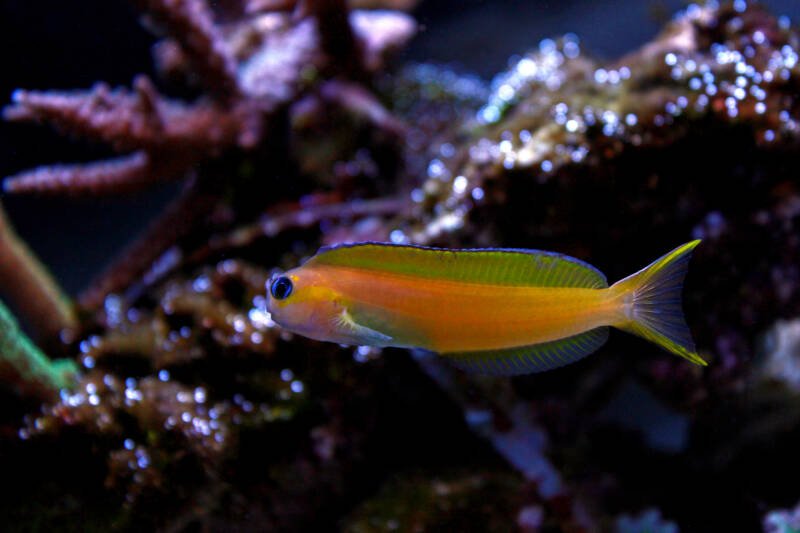
Minimum Tank Size: 30 gallons
The Midas blenny is a beautiful addition to a reef aquarium. These fish have a bright golden color and mesmerizing, eel-like swimming motion.
Overall, they are playful fish to watch, and their lifespan of five to eight years means you will be able to enjoy them for a long time.
Their generally peaceful nature allows them to get along with their tank mates in a community reef tank.
These fish enjoy perching on and hiding in rocky outcroppings.
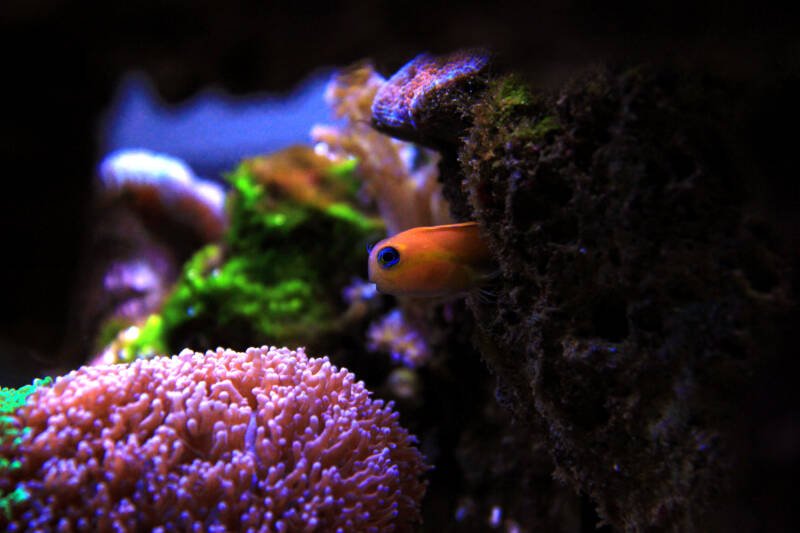
When setting up your tank, make sure there is adequate space dedicated to rock shelters.
The Midas blenny may become territorial with other blennies or nip at other small fish, especially if the tank is too small.
3. Blue Green Chromis (Chromis viridis)
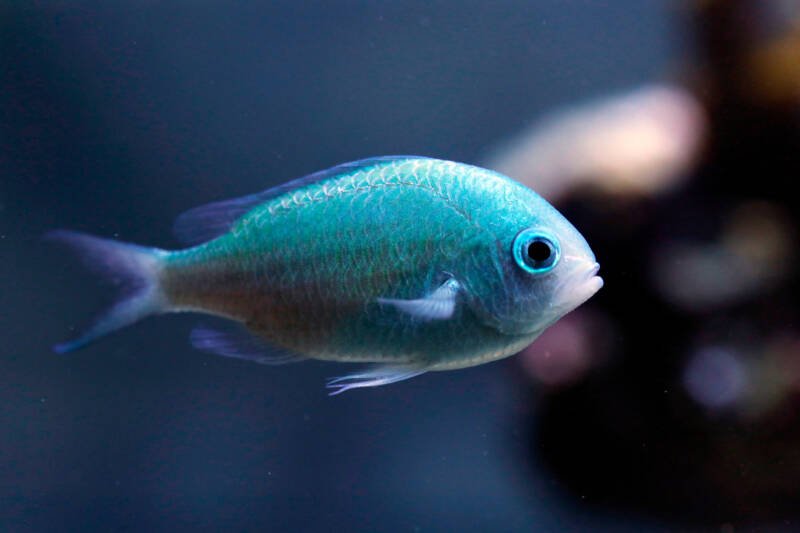
Minimum Tank Size: 30 gallons
The blue green chromis is an attractive, peaceful fish hailing from the waters of the Pacific Ocean.
Its body is a beautiful green with blue outlining the scales and brushing the fins.
They are hardy fish that can live anywhere from 8 to 15 years with good care.
They are active swimmers and prefer the middle to upper areas of the tank, so make sure there is adequate swimming space.
This fish will school with others of its kind in your aquarium and will not bother other fish, corals, or rocks.
Some keepers recommend a school with an odd number of chromis to avoid aggression among them.
4. Royal Gramma (Gramma loreto)
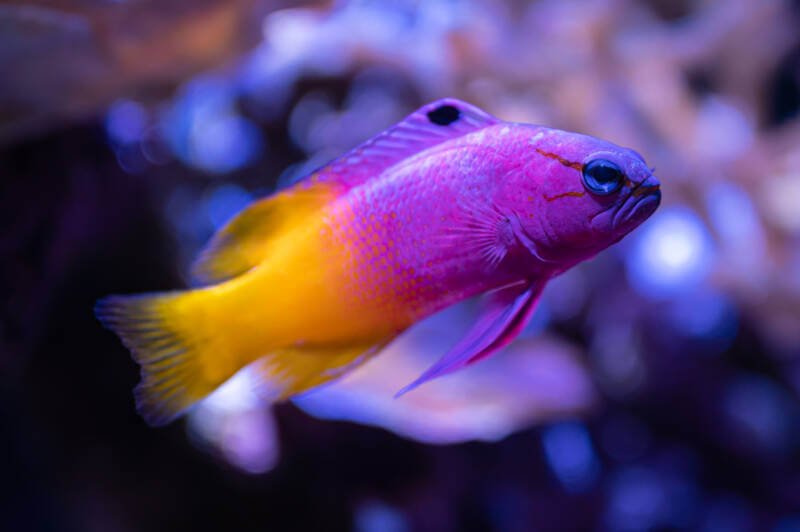
Minimum Tank Size: 30 gallons
One look at the royal gramma, and you can guess why this fish is so popular in saltwater aquariums.
Its bright purple front half contrasting with its equally bright yellow back half makes this fish a visually captivating addition.
In the wild, they dine mostly on plankton. In your tank, they will love the addition of brine shrimp and bloodworms.
Make sure your saltwater tank has plenty of hiding spaces for this somewhat shy fish.
Rocks, caves, and LPS or SPS corals all make great choices, and the royal gramma will spend most of its time there.
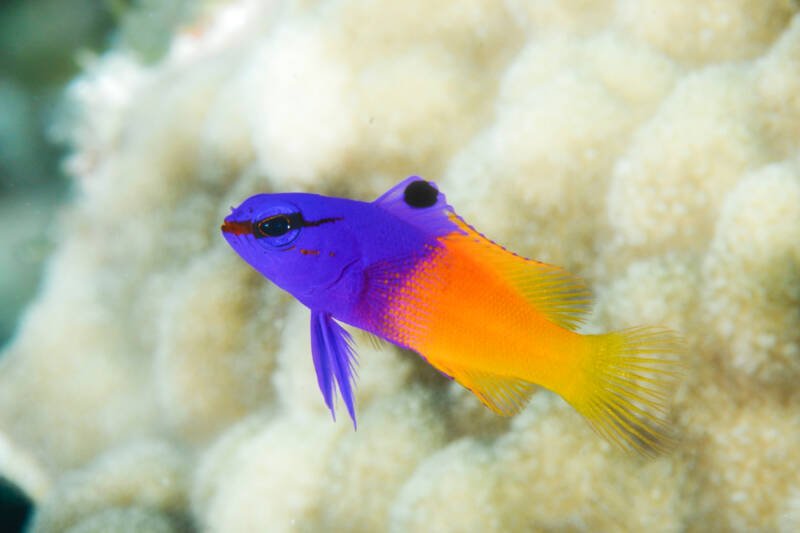
This fish is hardy and resists many common tank diseases as long as you maintain an appropriate water condition range.
Keep a tight-fitting lid on your tank as these fish can jump!
5. Six Line Wrasse (Pseudocheilinus hexataenia)
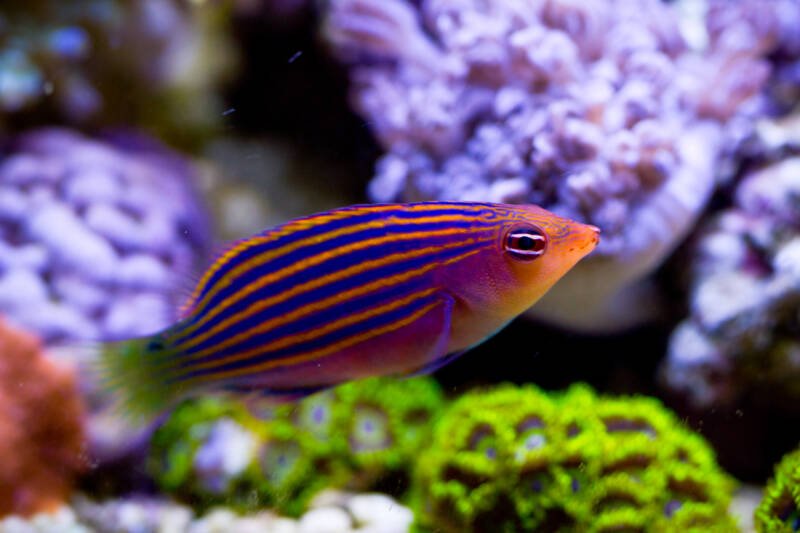
Minimum Tank Size: 30 gallons
The six line wrasse is a fast and hardy fish with a blue/purple body accented with orange stripes.
It also has two stripes on its eyes, giving a unique look.
This fish is valued by reef aquarium keepers not only for its looks but also for its ability to eat common tank pests.
This fish can be somewhat aggressive toward smaller fish and other wrasses.
It is best not to pair it with smaller, shy fish, such as the firefish or royal gramma.
A quick feeder, it is also best not to pair it with slow feeders, as they may not get enough food.
6. Banggai Cardinalfish (Pterapogon kauderni)
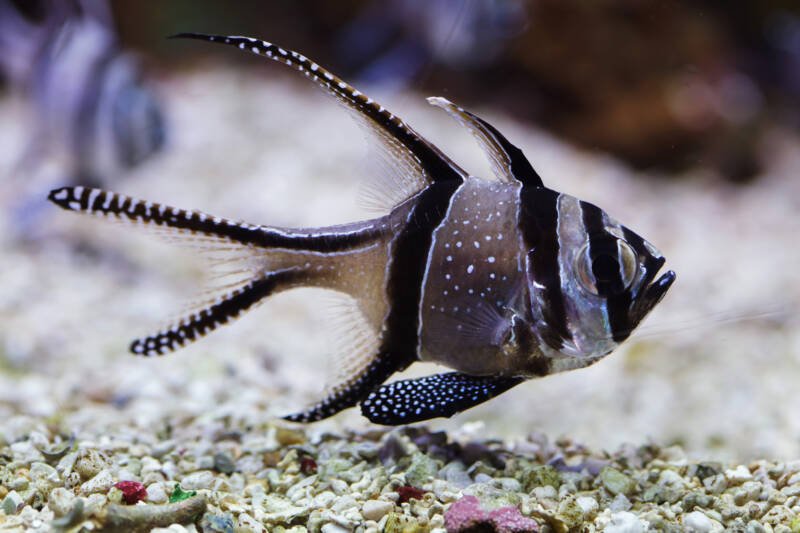
Minimum Tank Size: 30 gallons
The Banggai cardinalfish hails from Indonesia’s Banggai Archipelago.
This striking fish has a silvery body with uniquely patterned white spots and brilliant vertical black stripes highlighted with white.
Its fins are elongated and graceful, sweeping backward to its deeply forked tailfin.
This is a fish best kept in pairs or singly, especially if you have a smaller tank.
Larger groups may become territorial, especially if they have paired off for breeding.
An interesting fact about this species is that the male will brood its young in its mouth, releasing fully formed babies.
When purchasing a Banggai cardinalfish, ask whether they were captively bred or wild-caught. Go with captively bred to discourage destructive wild harvesting practices.
Captively bred fish may also be more easily introduced to your reef aquarium.
7. Pajama Cardinalfish (Sphaeramia nematoptera)
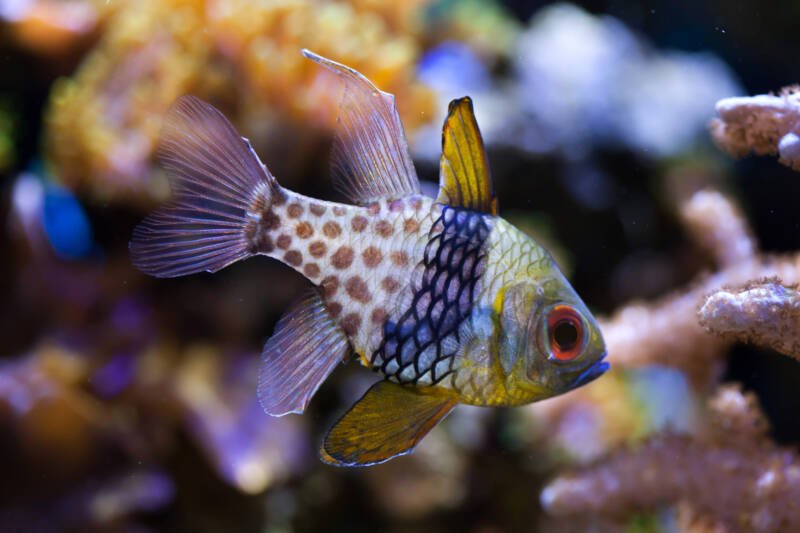
Minimum Tank Size: 30 gallons
Another popular cardinalfish, the pajama, is quite colorful compared to the Banggai.
It has large, brightly colored red eyes and a yellow head. Its mid-section features a dark vertical stripe, and its hind section is white and covered with red or brown dots.
This fish prefers open swimming space in the middle section of the tank and will school with others of its kind.
If you keep multiple pajama cardinalfish, watch for any aggression when they pair off for breeding.
Having a large enough tank can help by allowing adequate territory for the pairs.
As with the Banggai, the pajama is a mouth-brooding fish.
8. Azure Damselfish (Chrysiptera hemicyanea)
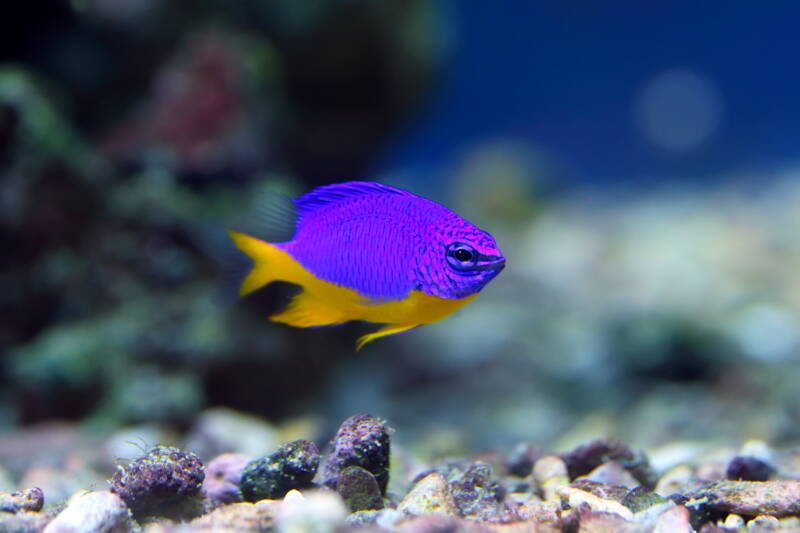
Minimum Tank Size: 30 gallons
The azure damselfish’s native habitat is wide, extending from the western Pacific and Indian Oceans to parts of the Australian reefs.
It is brightly colored, with a brilliant blue head and back contrasting with an equally brilliant yellow belly and tail.
This extremely hardy fish has a long lifespan of up to 15 years with proper care.
This fish is an active swimmer and is frequently seen darting about the tank.
Include rocks and other decorations to allow your fish a place to retreat when needed.
Occasionally, the azure damselfish can be aggressively territorial with other, more peaceful fish in the tank. A large enough tank can help to reduce the chance of aggression.
9. Dragonface Pipefish (Corythoichthys haematopterus)
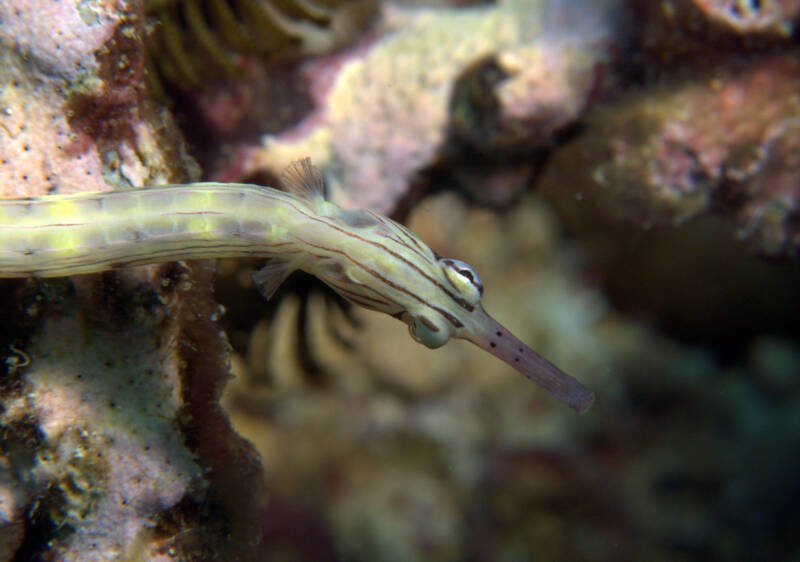
Minimum Tank Size: 50 gallons
The dragonface pipefish has an elongated, cream-colored body with patterns in black, pink, or yellow. These patterns are unique to the individual.
The male of the species has a brooding pouch on its belly.
Like the mandarin fish, this species loves to eat live copepods and must be trained to accept prepared foods.
This fish has a snakelike swimming motion and a highly mobile tail that can help anchor it to rocks or corals.
Because it is a slow swimmer, do not pair your dragonface with aggressive or fast-moving fish.
Some anemones or stinging corals can harm this fish.
However, this fish can help control the population of “red bugs” in your tank, which can harm your coral.
10. Mandarin Fish (Dragonets)
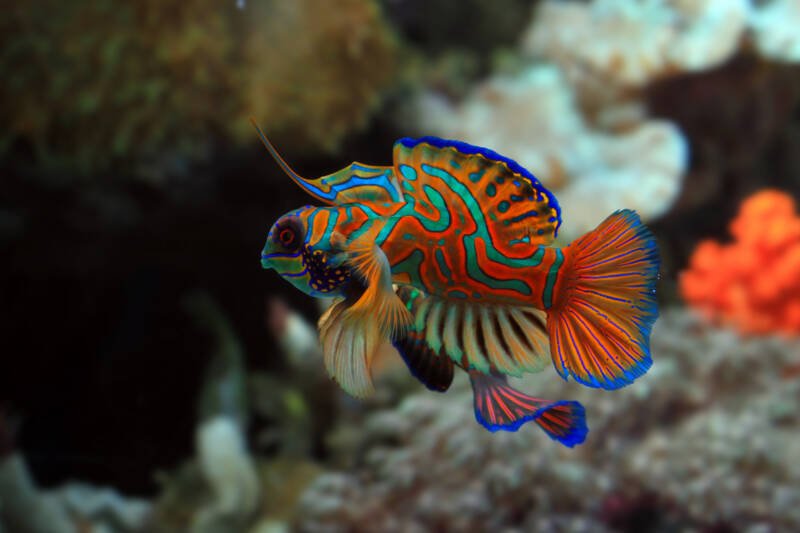
Minimum Tank Size: 30 gallons
The mandarin fish is undoubtedly one beautiful reef dweller.
They are prized for their bright orange and blue coloration in sweeping lines and swirls around its body.
This slow-moving fish spends its time in the bottom portion of the tank around rocks or reef features.
Males can easily be identified by the elongated spine on their dorsal fin.
The biggest challenge with keeping the mandarin is keeping it well fed.
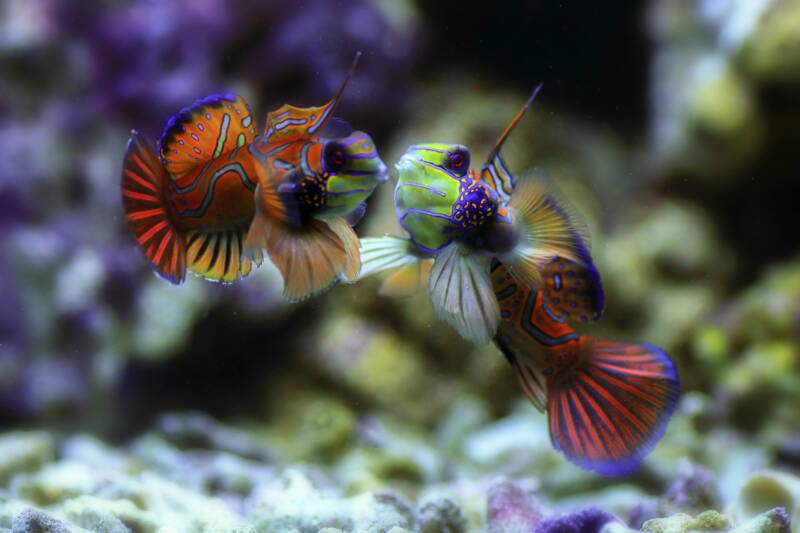
Mandarins must be acclimated to eating prepared foods commonly available in an aquarium, as opposed to the live copepods that they hunt in the wild.
They can be trained to accept brine or mysis shrimp, but it takes some effort.
11. Tangs (Surgeonfish)
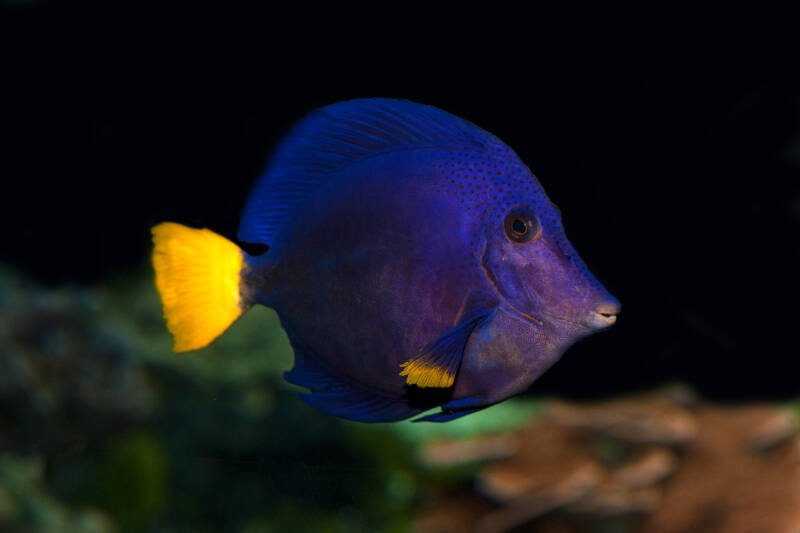
Minimum Tank Size: 100 gallons
There is a wide variety of tang species, all of which are beautiful additions to a reef aquarium.
Their colorations range from the brightly colored yellow tang to the many-striped sailfin tang to the subtle yellow/black fade of the scopas tang.
The blue tang and purple tang variations have contrasting yellow tails, while the naso tang has contrasting dorsal and ventral fins.
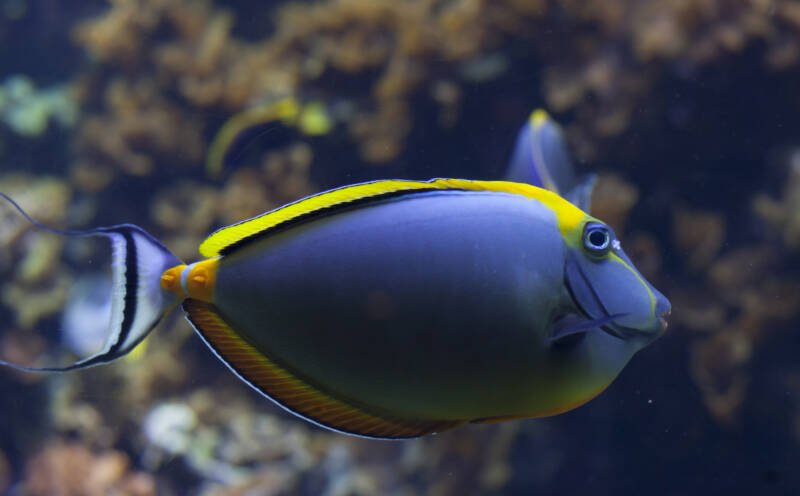
You may see some aggression from your tang toward other tangs in the tank, but the fish should not bother other species.
Keep on top of your tank’s water conditions as these fish are slightly more susceptible to ich as well as head and lateral line erosion (HLLE).
12. Orchid Dottyback (Pseudochromis fridmani)
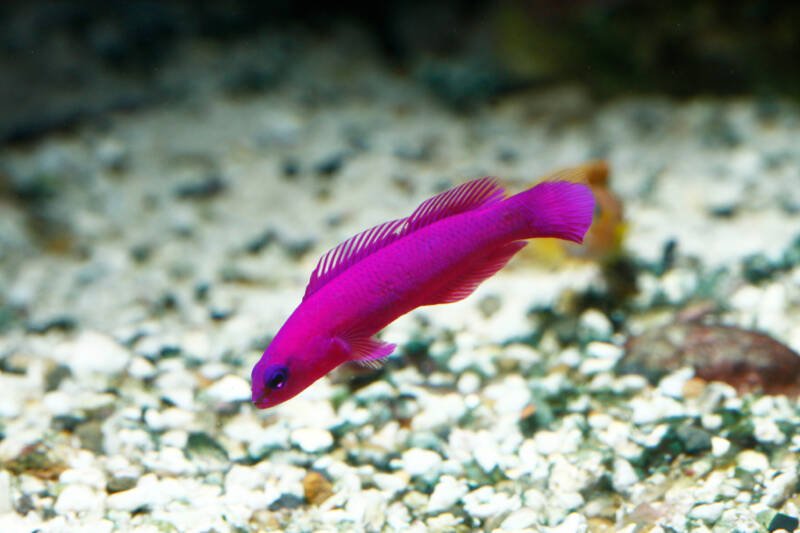
Minimum Tank Size: 30 gallons
The orchid dottyback comes from the warm waters of the Red Sea.
A deep purple and red hue, this slender fish is a darting swimmer once it is accustomed to your tank. It does like to have holes or rocks in which to shelter.
The orchid is a hardy fish with a lifespan of five to seven years.
If you wish to keep more than one orchid dottybacks, consider adding two or more at the same time.
If you add a new fish to a tank with an established orchid, it may show territorial aggression.
Also, avoid pairing this fish with very shy or slow feeding fish as their feeding can be quick and somewhat aggressive.
These fish will not harm the corals and invertebrates in your tank, and it is best to introduce them to the tank last so that they will not attack any new fish.
13. Tailspot Blenny (Ecsenius stigmatura)
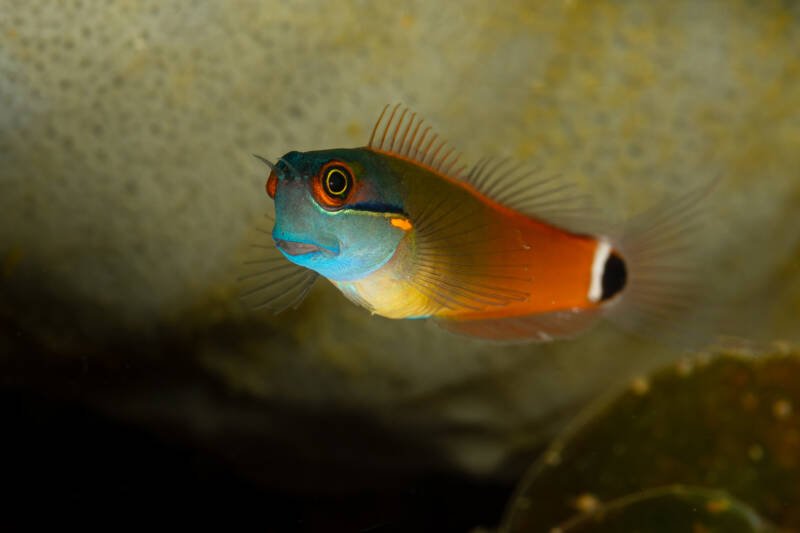
Minimum Tank Size: 10 gallons
The most distinguishing aspect of the tailspot blenny is, you guessed it, a prominent dark spot on its tail.
Beyond that, the tailspot has an interesting look. Its body is long and thin. Its head has a unique shape, large eyes, and a black/yellow band running underneath its eye.
These are shy fish. Do not pair them with overly aggressive species as it may result in your tailspot spending more time hiding.
Ensure your reef aquarium has plenty of live rock.
These algae eaters can be considered the clean-up crew and will snack on any algae in your aquarium.
In addition, they will eat commercial algae-based frozen or dried foods.
14. Longnose Hawkfish (Oxycirrhites typus)
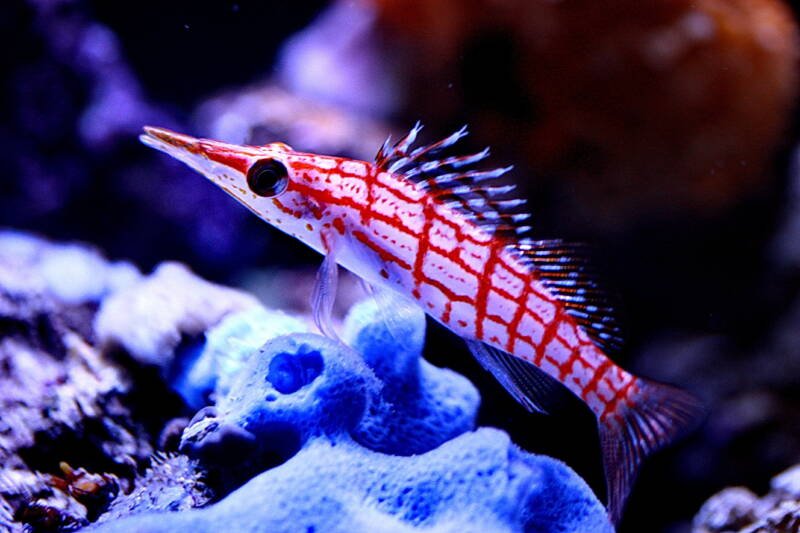
Minimum Tank Size: 30 gallons
The longnose hawkfish is easily identified by its extended snout. It has a white body with an orange grid-like pattern.
In the wild, this fish is usually found alone or in small groups.
In an aquarium setting, they are best kept as a single member of their species unless the tank is large enough to support additional hawkfish.
This fish needs plenty of rock features on which it can perch and retreat to when needed.
They can go after smaller invertebrates, snails, and crabs.
Keeping your longnose hawkfish well-fed may help prevent them from preying on invertebrates or nipping at corals.
Have a tight-fitting lid on your tank as this species can jump.
15. Green Bird Wrasse (Gomphosus various)
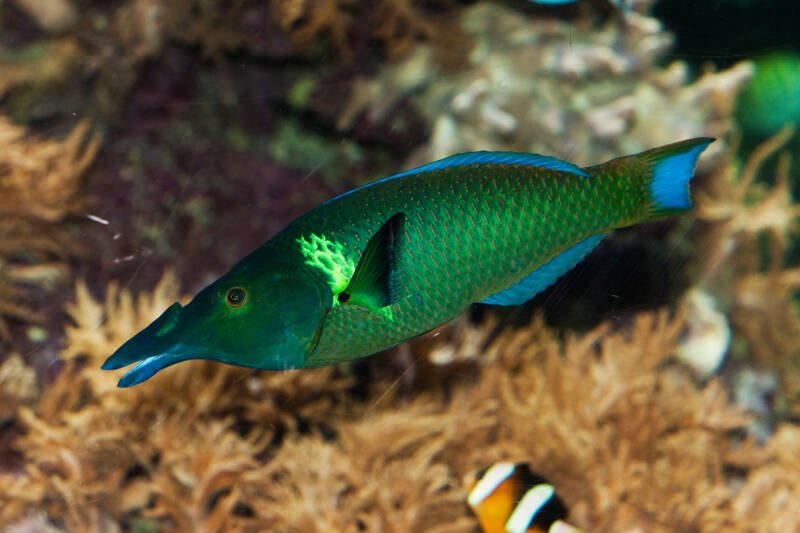
Minimum Tank Size: 100 gallons
The green bird wrasse is immediately recognizable by its deep green color and uniquely shaped mouth.
A larger reef fish, the green bird grows to a maximum length of 12 inches.
The green bird is the male of this wrasse species. Females are a brown to black color.
Keep this active swimmer in a longer, rather than taller, tank. Make sure the lid fits well as this fish can jump.
Add plenty of rocks and caves for your green bird wrasse to explore. This fish may not be your best choice if you plan on keeping invertebrates in your tank.
With its long, beak-like mouth, the green bird wrasse can easily explore spots in-between corals to get at these snacks.
16. Firefish (Goby) (Nemateleotris magnifica)
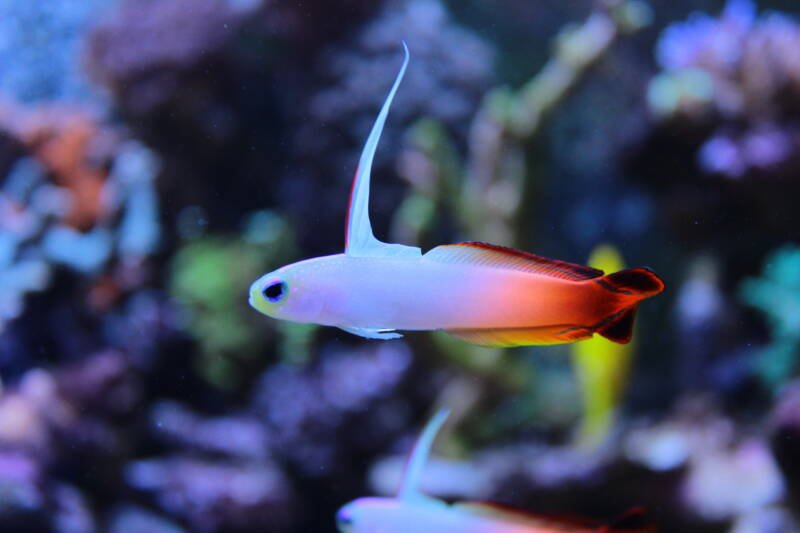
Minimum Tank Size: 10-20 gallons
The firefish is a slim, fast-swimming fish that spends most of its time above the reef but with quick access to its hiding place.
It is beautifully colored, with a white or yellow front end that gradually transitions to a red or orange back end.
Their dorsal and anal fins have a black trim, and they have a distinct extension on their dorsal fin.
This species is peaceful, almost overly so, and will not harm corals, invertebrates, or other fish in the tank.
It does tend to burrow, so keep that in mind when selecting substrate for your tank.
Some aquarium keepers recommend keeping no more than two firefish together. Any more than that, and you run the risk of them displaying aggression toward each other.
17. Starry Blenny (Salarias ramosu)
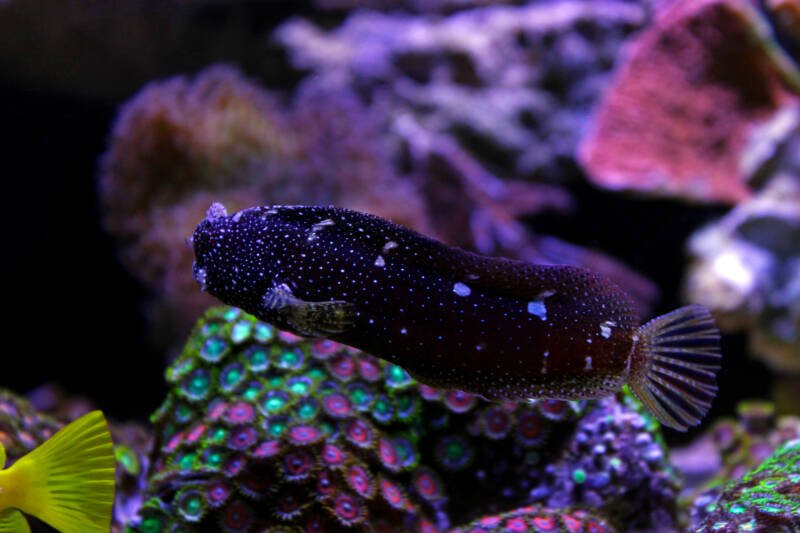
Minimum Tank Size: 30 gallons
Continuing the theme of blennies with unique looks, the starry blenny does not disappoint.
Its body and fins are dark brown and covered with white dots.
They also have cirri extensions between their eyes, allowing them to feel changes in the water that indicate danger.
This fish needs plenty of live rocks in the aquarium as it spends its time munching on algae and can help control algae growth.
When not searching for food, it will perch on the rock and check out its surroundings.
While it is generally considered reef safe, be aware that it can pick at clams and some corals if it is underfed.
It is peaceful toward other fish but may be perturbed by ones with a similar body shape.
18. Possum Wrasse (Wetmorella albofasciata)
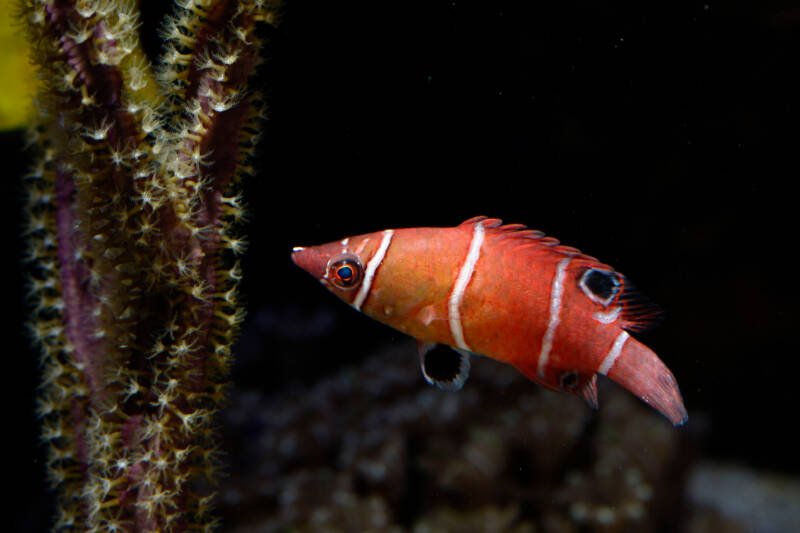
Minimum Tank Size: 15 gallons
Another in the wrasse group, the possum wrasse, has vivid coloration, with an orange body, thin vertical white stripes, and large black dots on its dorsal and anal fins.
Its pectoral fins also feature a splash of black.
You can safely pair corals and invertebrates with the possum wrasse.
These fish are jumpers, so keep that lid on tight. They are also very shy, tending to shelter in their rocky hiding spaces for a good amount of time.
Avoid pairing them with more aggressive fish as it may be more difficult for the possum wrasse to get enough to eat.
19. Sunburst Anthias (Serranocirrhitus latus)
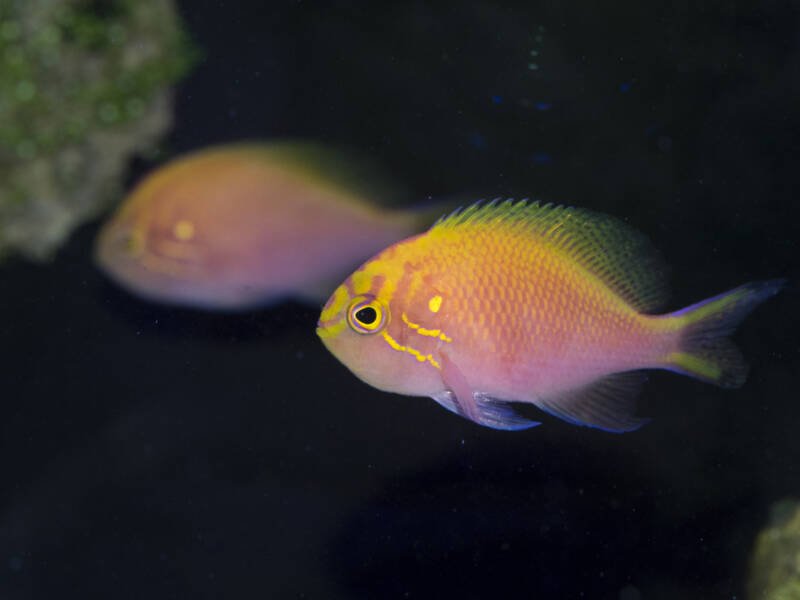
Minimum Tank Size: 75 gallons
The sunburst anthias is a brightly colored fish with an orange body highlighted with flecks of gold in its scales.
You will see rays of gold streaming outward and back in its characteristic sunburst look from the space between its eyes.
This teardrop-shaped fish is shy and gentle with corals and invertebrates.
It does need plenty of hiding spaces, however, to make it feel comfortable.
This fish prefers living on its own or in a pair. If you plan on keeping more than a single sunburst anthias, go with larger tank size and include plenty of hiding spots to prevent confrontations.
What You Need to Know
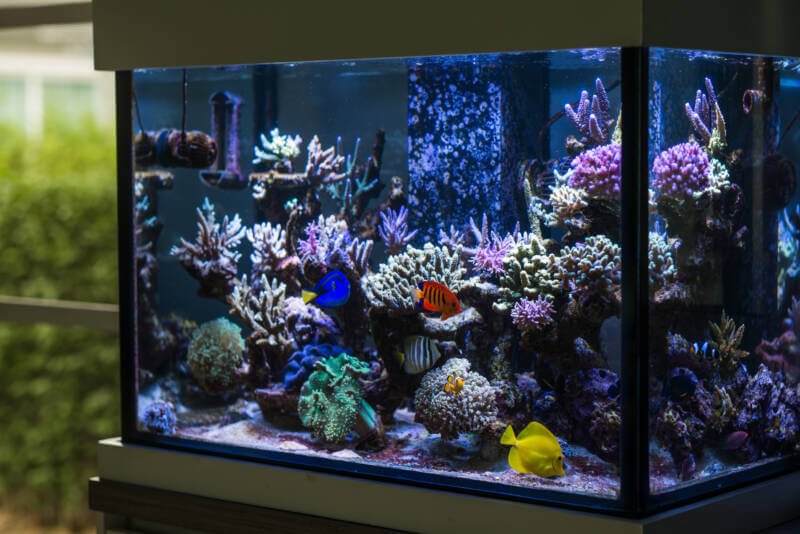
Do your research and have some background information when selecting a fish for your saltwater aquarium.
Some fish simply do not pair well together, such as aggressive feeders and slow-moving fish. Others do not do well in a group of their own species and may show territorial aggression.
Still, other species may nip at corals and invertebrates if not well fed. Some may have challenging feeding requirements.
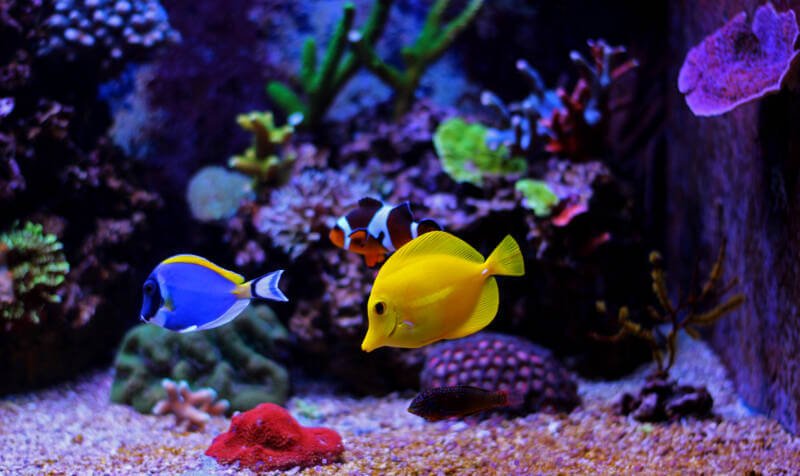
Know the benefits of fish you introduce to your aquarium. Some control algae growth, and others snack on potential parasites.
In all cases, you would be wise to invest in water test kits to ensure the water quality is optimum for your fish. This will help to prevent sickness and common tank ailments.
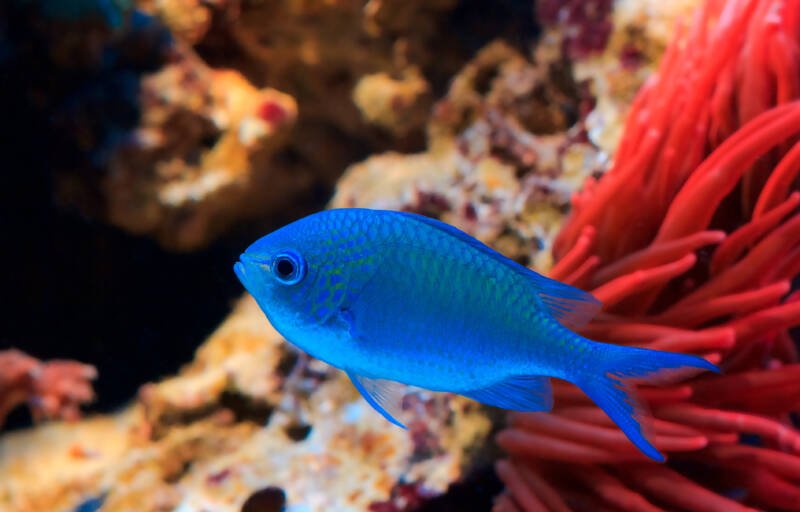
Below, we list 19 candidates for your reef tank, along with some things to consider when selecting that species.
Closing Thoughts
In the end, your research into species compatibility, behavior, and care needs will go a long way toward ensuring a peaceful saltwater tank environment.
There are many reef-safe options available, and looking into each species will save time, effort, and money over simply placing species together and hoping for the best.
What are your favorite reef fish companions?
What challenges did you have in selecting inhabitants?